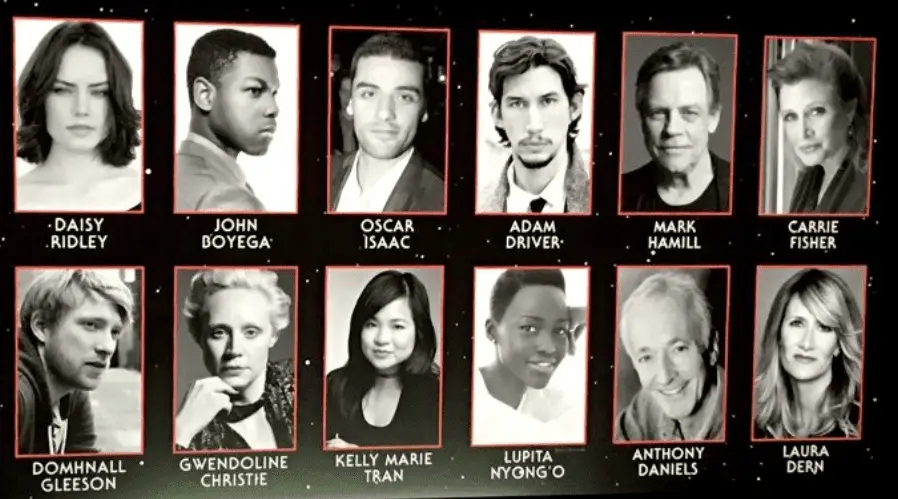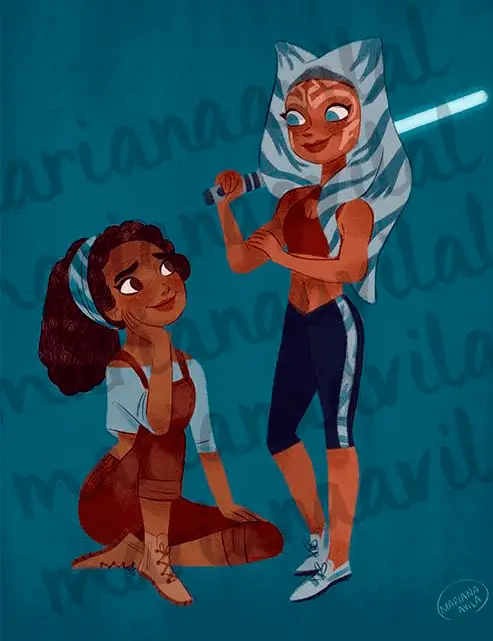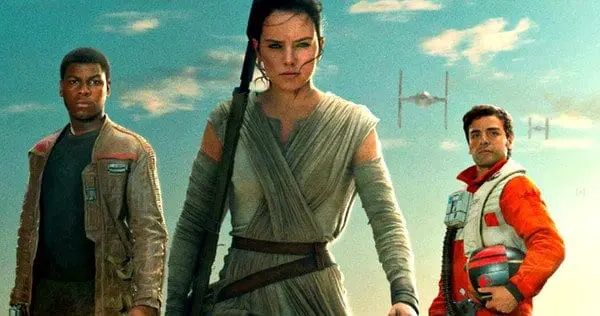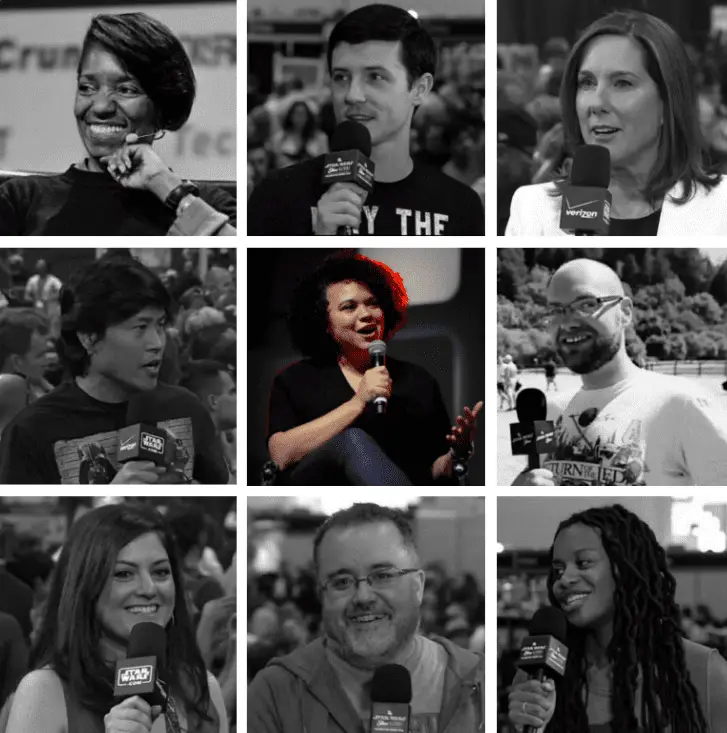I know, I know, saying this makes me sound like I might be the one who’s crazy. The announcement that Lucasfilm has hired David Benioff and D. B. Weiss (D&D) of Game of Thrones fame (or infamy, from a certain point of view), has the internet up in arms, and most people aren’t pleased. I was one of them, just ask the five different people I was simultaneously having a conversation with about it Tuesday afternoon. But you know what? This might not actually be terrible, and there may even be a method to the seeming madness of this decision. I know. I know.
Yes, this seems bad for lots of really valid reasons. D&D aren’t exactly known for having a good track record with their treatment of marginalized identities. The general consensus right now is that they’re not even that great of writers. Even some of their most vocal fans say that S7 of Game of Thrones was poorly scripted, poorly plotted, and thinly characterized because of the lack of book material. That isn’t exactly a glowing recommendation for their ability to create original content. The most logical conclusion based on the announcement that D&D are going to make a series of Star Wars films is that the choice is a blatant cash grab, nothing more. I agree, and you know what, that might not be a bad thing. No! Don’t run away; please just hear me out.
Building a Diverse Franchise
I’ll begin with a hypothetical: if someone wanted to create an internationally recognized cross-media franchise as a lasting bastion of diverse storytelling in a world where the film market lies at the intersection of capitalism and structures of marginalization, what would that look like?

To my mind, one would begin with a safe bet. Since movies are the money makers, start by laying the groundwork with a film that may not push a lot of boundaries but will set the stage for other films that might. Draw people in with something that has just enough diversity to prove that’s an area of interest but not so much that more conservative fans freak out. Then, reinvest the money made there into more experimental projects that may not make as much money (books, comics, web series) but build up the framework of an inclusive, diverse environment. Hire diverse creators in those mediums and have them start crafting inclusive content that appeal to marginalized groups. No need to worry investors if those don’t make as much money, because you still have the films to bring in the big bucks.
Make a couple more ‘popcorn’ style movies that may not be exactly boundary pushing, but aren’t offensive. They’re entertaining and keep your investors believing you’re going to make money and the fans convinced that you will entertain them.
Maybe you start to branch out a bit. You make a more inclusive movie with strong thematic content that points toward your larger goal of diversity. If fans lash out and shareholders start to worry that maybe you’re not going to be able to make them the money you promised, you offer a few more low risk, entertainment oriented movies. This mollifies them, and you can take the billion dollars you make from the popcorn movies and invest it in one (or more) inclusive films or tv series.
At every turn, you try to balance spreading the risk with making sure you never lose sight of your overarching goal. Maybe you have to make more inoffensive, non-‘threatening’ movies or tv series than you planned, but you never stop also making the diverse, inclusive, theme driven media. Slowly, over time, you push the boundaries a bit further with every experimental piece of media you make.
Five years in, you can make a movie you never would have been able to make at the outset without potentially losing everything. Ten years in, you can have a franchise that’s more than 50% the kind of content you wanted to make in the first place. Twenty years down the line you’re making a movie about an Asian archaeologist and her big gay mess of a girlfriend followed by one about a devoted monk and his skeptical husband who likes big guns, followed by another about a team of ladies who have to sort out a prison that’s been taken over by hostile forces. Almost every single one of your pieces of media is diverse and led by strong characters that come in every conceivable shape and size.
And no one bats an eye that these are the films being made because over those twenty years, you’ve been able to slowly push the boundaries in a conservative, capitalist system of film making. You’ve also proved along the way that diversity sells, and now Hollywood is a more progressive place because you put in the hard work and took your time. Was compromise necessary? Yeah, but you didn’t hurt anyone or perpetuate any toxic stereotypes with the less experimental pieces, even if they weren’t exactly groundbreaking.
You might have stumbled a few times here and there, but overall you accomplished the goal of increased diversity on screen, behind the camera, and in the writer’s room. And, you found a way to win over many of the fans and shareholders who would have rejected your plan at the outset. You’ve made the world a bit better and created space for voices to be heard that never had a chance.
To my mind, this is the safest, most secure way to build a that franchise in a way that could both last longer than a few one offs and potentially change the atmosphere of Hollywood.
And this appears to be exactly what Lucasfilm is trying to do.
Evidence of an Overall Goal of Increased Diversity: Star Wars Expanded Canon
If all you’re familiar with is the film franchise, this isn’t obvious. That’s totally fair. The books and comics really aren’t the big money makers in the Star Wars universe. Plus, the original Extended Universe (EU)/Legends content was more optional reading than necessary extension. When George Lucas ran the franchise, there were tiers of canonicity with films at the top. If a book or comic contradicted a movie, it was less ‘canonical’ than a film and could be safely ignored.
The new Expanded Canon (EC) doesn’t work the same way. There are no tiers. There’s just the one singular continuity and everything fits within it.
“Every aspect of the Star Wars universe — films, television, books, games, comics — is held to the same standard. Book and comic announcements are major news, and nearly everything — across all media — connects to tell the story of a cohesive galaxy.” (source)
As much as it may not feel like it when one is only looking at the films, the new Star Wars universe is actually quite inclusive. More so than any other franchise of the same caliber right now. The books and comics are populated with some of the most intersectional and diverse protagonists I’ve ever seen. There’s an entire web series (and now a comic series) called Forces of Destiny that’s dedicated to highlighting strong female characters from all kinds of races, species, and levels of Force sensitivity (or not). There are canonical LGBT+ protagonists and secondary characters. There are women of color in every kind of role and alignment possible, and some of them are queer. There are people of all sizes, shapes, and ages possible. There are neurodiverse, differently abled, and mentally ill characters.
You name it, I could give you at least two or three recommendations from the EC to engage in.

Granted, not everyone who goes to see the films also reads the books or comics, which, to my mind, is why Lucasfilm has been able to be more experimental with those mediums. They don’t have the same pressure to make money as the films do. Even if there were more fans buying EC materials, they’d never be able to reach the same numbers as a huge blockbuster film can. You can have a comic like Doctor Aphra that centers a queer woman of color more readily than you can have a film that does the same.
The Need for A Long View
It can be tempting to buy into the capitalist framework that only the films ‘count’ for representation, and at some level, that makes sense because that’s what most people will see and engage with. In any multi-media, cross-platform franchise the money makers are going to be the films. So, they need to be ‘safer’ storytelling-wise to both recoup the cost of production and fund projects that will overall make less money. Does it suck? Big time. I’m not denying that.
At the same time, creating ‘safer’ stories for the big screen may be necessary in order to ultimately get more of what we want—diverse stories on our big screen. The Last Jedi had a $200 million-dollar budget and made $1.3 billion. That’s a shit ton of money that can now be poured into giving us more Star Wars stories led by LGBT+ characters, protagonists of color, and female characters. The same applies to Solo, which seems on track to be an average movie, but not really all that challenging to viewers expectations, unlike The Last Jedi.
Again, it sucks. In an ideal world, they could make a Finn/Poe movie and have it make a billion dollars that could then be used to make a Reyva or Sana Starros movie. But the unfortunate reality is that right now, movies led by diverse characters do not make as much money in international markets, and sometimes not even in domestic markets. That, or producers don’t think that they do, making them less likely to invest in boundary pushing movies, which means the market has no chance to change, etc., etc.
That’s evolving for sure, because franchises with enough money to ‘spare’ to be experimental are giving diverse movies a chance. Films like Wonder Woman and Black Panther exist and made/are on track to make loads of cash. But remember, films like Black Panther and Thor: Ragnarok exist because Marvel made Doctor Strange, two Guardians of the Galaxy‘s, and three Iron Man movies first. DC made Batman vs. Superman before it made Wonder Woman. For every Jessica Jones or Luke Cage, there is an Iron Fist or Agents of S.H.I.E.LD. that may push some boundaries, but not consistently or thoroughly enough to satisfy marginalized fans. For every one movie or tv show that centers a (team of) diverse protagonist(s), there were multiple predominantly white male centered ones.
Until our society in general, and specifically privileged fans and shareholders, catch up to a new standard of being able to identify with characters who don’t look like them, we may have to put up with a few mediocre movies from some of our favorite franchises. Even a juggernaut like Star Wars is going to have its average, entertainment-driven films. That doesn’t have to be bad. I think we have to be willing to take the long view and understand that we can’t change the way Hollywood works overnight, as much as we’d like to. Making money on ‘safer’ movies can be used to push the boundaries and expand the Hollywood paradigm one inch at a time.
Not All Money-Making is Corporate Greed
Alright, so maybe I’ve got you on board with the idea that it can be for the best to have something average like Solo so that we can ultimately get more of what we want (films like The Last Jedi or better). I can’t speak for Marvel or DC, but from what I see in the Star Wars EC, the overarching goal is to create more diverse, inclusive content not less. And if it seems like D&D are a step backward, I feel you; that was my first reaction as well.
However, in the past couple of days, I’ve started to change my mind. I’m trying to see it more as a parallel or side path that exists purely to generate revenue. Giving D&D a film franchise doesn’t have to be to the exclusion of other, diverse content; it can be in addition to it. A buffer so that any one inclusive film doesn’t have to bear so much of the weight of making money to ensure the franchise as a whole succeeds.
Does it feel like Lucasfilm might already be a big enough cash cow that they don’t need this buffer? Sure. I feel that. And to that end, I ask you a question: if tomorrow Lucasfilm announced they were only going to make diverse films with diverse writers, producers, and directors, how long would they would last as a franchise? A year? Two years? Five?
Look, I’m not saying it isn’t an admirable goal or that we have to like the compromises necessary to achieve it. We don’t have to like it. Waiting for things to change sucks, especially when we’ve had to wait so long already just to see minimal movement. I’m as anxious as anyone for a time when “just wait” isn’t something I have to hear when it comes to representation of any marginalized identity. But, I do think maximum diversity is the ultimate goal of this franchise. To get to a point where they can make mostly inclusive movies and still have momentum and money to keep making even more.
However, right now, there are still people arguing that The Last Jedi should be struck from canon, that Rose and Finn are a waste of time, that Poe Dameron is the ‘real’ villain of the film, and Kylo Ren is justified in all of his choices because he had a ‘sad childhood.’ Does that sound like a fandom that’s ready for only diverse movies? Do you think that given these reactions Kennedy and Co. could convince their shareholders that they could make money off of only diverse films? Maybe I don’t have enough faith in humankind or my society, but I don’t.

I don’t think the investors are ready to take that risk. Frustrating as it is, most of them still believe that the 18-35 year-old white male market drives the industry. That may not be true, but if that perception is widely accepted, appeasing those investors would be necessary in order to guarantee continued funding to make the more diverse ‘risky’ films those same investors don’t believe will sell. As they say in the business world: no money, no mission.
I’ve Got a Bad Feeling About This
Alright so, maybe you agree with me that making average movies in order to push for more diverse media over time and overall is an acceptable model. But why chose D&D of all people to make these average movies? Don’t they stand for everything opposite of Star Wars? They’re into edgy narratives, sexposition, and grimdark nihilism. Game of Thrones is the opposite of hope-driven, and their writing isn’t even all that good. Why was this the direction Lucasfilm went with?
It’s worth pointing out that I do not believe D&D would be able to fall back on their darker impulses. I agree with Kylie that Lucasfilm is nothing if not on-brand. They’re highly aware of their messaging and thus far, it’s consistent. Even Rogue One and The Last Jedi, which were marketed as ‘darker’ and ‘more adult’ than other films, ended on hope. Plus, there’s no way Lucasfilm will give up their PG-13 rating. For all the ‘jokes’ about rape and sexposition I’ve seen going around, that’s not going to happen. This is a family friendly franchise and that’s not going to change any time soon. So, no, I don’t think we’d get grimdark Star Wars.
As long as they’re not harming people or actively contributing to negative stereotypes with the mediocre movies they make that cater to less progressive audiences, there’s no drawback. To my mind, there are a few ways this could play out and none of them are terrible.
Since they won’t be able to fall back on their HBO shock and awe tactics or exploitation of women’s bodies, my worst-case scenario is they make a few flashy, insubstantial, popcorn movies that may not feel like ‘real’ Star Wars movies to me, but other people enjoy. And if they end up making something about the level of what the Han Solo movie seems to be shaping up to be (or even less substantial), why not? The franchise will make money off of it that can then turn around and be invested into more diverse media.
If these insubstantial movies don’t make money, Lucasfilm goes back to the drawing board and D&D go away. Such an outcome could even be used as leverage for creating more diverse movies if those make more money than whatever D&D come up with. Purposefully making a mediocre, less diverse flop could very well work to the benefit of inclusive films. I admit that might be stretching the argument too far, but still, worth considering.
If D&D prove that they can’t work within the constraints placed on them and either get fired or quit, nothing is lost. Then, I suppose there is always a chance they could make something I find interesting (how’s that for plausible impossibility?). Regardless, I don’t see a real drawback here.
Still, couldn’t Lucasfilm have gone with more creative choices? Kennedy has said she has “every intention” of hiring women directors, though has yet to deliver. We also need more people of color and LGBT+ folks behind the camera as well as centered on screen. It’s perfectly reasonable to demand that Lucasfilm put its money where its mouth has been and start hiring diverse film directors, producers, and writers. I’m the first to agree that D&D are ‘safe’ choices and will likely make ‘safe’ movies.
Yes, Lucasfilm hasn’t announced any women or non-white creatives on film projects, but they still can. We know Kennedy met with Reed Morano. It may be that hiring D&D was necessary to appease investors so that they could take a chance on Morano or another female director. Does it suck that concessions like this may need to be made? Boy howdy it does, but as I said above, unfortunately it might be necessary to get what we want.
Why Give Them the Benefit of the Doubt?
One problem with stats like,
“In the last 41 years, 24 people have been hired to be writers, directors or creative leaders of 17 ‘Star Wars’ films. Not all of them stayed throughout the entire production. Of those hires: 23 were white men. 1 was a white woman.” (source)
is that while they’re not wrong, they’re not entirely right either. For one, as many have pointed out, it ignores the often-unnamed contribution of women like Carrie Fisher or Marcia Lucas née Griffin as script doctors and editors. Moreover, it takes for granted old patterns of film-making in the Star Wars franchise that no longer apply to the new canon.
Star Wars is no longer a franchise that revolves solely around the work of a single auteur/creative mind who controls every film, or even every detail on any one film. Even the people who write, direct, and produce the films are beholden to Kathleen Kennedy and a team of people who direct and develop for the entire franchise in all its media forms: the Lucasfilm Story Group (LSG).

When Kennedy was tapped by Disney in 2012 to create the LSG when they took over from George Lucas, she put Kiri Hart, a woman of color, in charge of it. Hart then immediately hired two more women, one of whom was another woman of color. So, the original team comprising the creative force for new canon Star Wars was 50% people of color and 100% female. In the past four years, the team has added new members, but it’s still highly diverse.
“Today, the Lucasfilm story group is a diverse outlier in Hollywood: five of its members are people of color, and the team includes four women and seven men. This is a rarity in 2017, where women account for 13 percent, and minorities represent 5 percent, of all writers working on the top-grossing films.” (source)
Kiri Hart still heads up the LSG and is the Senior Vice president of development at Lucasfilm. (She’d also likely be the next logical person to take over if Kennedy were gone). Is there room for improvement? Always. And, it is worth noting that the team heading up continuity and development is helmed by the most diverse team in major franchise history. This is the team that writers like D&D would be beholden to.
To draw an analogy from business, the writers and directors of the individual films are the project leads that you bring in depending on suitability for a specific task, and the LSG is your board of directors. They have to be happy for something to stay canonical. And, according to Kiri Hart herself LSG has a very specific goal:
“In addition to maintaining the continuity of the Star Wars universe, they aim to increase its diversity.”
This is the team that pushed for Ahsoka Tano’s continued inclusion in the franchise and fought for her story to be told in whatever medium possible, even after The Clone Wars was cancelled. This is a team Rian Johnson heavily consulted with while writing The Last Jedi, even going so far as to move to San Francisco for six weeks in order to work more closely with them.
Now, there is a tremendous amount of freedom given to writers and directors within this oversight, but that doesn’t mean that they can do whatever they want. The firing of creatives like Josh Trank, Phil Lord, Christopher Miller, and Colin Trevorrow proves that Kennedy and the LSG will flex their authoritative muscles if the director’s ego or vision doesn’t jive with the franchise’s overall goals and ethos. The mistake I see people make is assuming these decisions are made by only Kennedy herself, and not her in consultation with the development team she created to help control the narrative.
Now, I can’t prove who made these choices per se, but the point I’m making is that Star Wars isn’t the property of a malicious, tyrannical overlord. This is a franchise that specifically set out to be collaborative, hence the creation of the Lucasfilm Story Group to control development, canonicity, and provide guidance and direction to individual creators. The LSG is intentionally diverse, helmed by a woman of color, and less than 50% white males.
Does this diversity mean they’re immune to making mistakes or immune to criticism? Of course not. They’re not perfect. As I’ve said, there is marked room for improvement for diversity behind the camera to line up with the intentional diversity both on screen and on the creative team.
At the same time, I do think more people need to be aware of how diverse the team is behind Star Wars as a franchise. Creators they hire might stumble every now and again, or fall into negative, unintended implications. But this really isn’t an anti-woman or anti-person of color franchise anymore. Women and people of color are leading it and developing it.
And that’s why I’m willing to give them the benefit of the doubt even when they announce hiring people like D&D.
Is It Worth It?
To sum up, the Twitter reaction Kylie cited in her piece a couple days ago may not be wrong, but it may be missing the overall goal. From what I see in the EC and know about the team behind it all, Lucasfilm doesn’t want to make fewer movies with women and people of color, they want to make more. And right now, soothing a potentially hostile market, and the shareholders who care about that market, with a promise of something made by popular writers/producers that might not be great, but will likely be entertaining could work to our benefit in the end.
The big question is, even if this is what Lucasfilm is doing, is it worth it?
My answer? Yes.
If the larger goal and direction for SW is to expand the sandbox of what is acceptable, desirable, and sought-after in media to be more inclusive and diverse, I’m willing to accept that may mean we get some Solos (or even *shudder* a Boba Fett movie). Again, only so long as the films being made are not outright offensive or harmful to marginalized groups. Bland? Sure. Mediocre? I can live with that. Heck, I’ll even give them my money for those shallow popcorn movies if it means I get more diverse content elsewhere for now and maybe on the screen further down the line.
It may not even take that long to get that diverse content. Disney is developing multiple Star Wars tv series for its upcoming streaming service. We could be seeing an Ahsoka driven show, or a Lando series (please oh please give me a Lando mini-series in the style of Leverage about the con who cons the Empire). But, playing the capitalism game with a franchise looking to maximize diversity is going to need a lot of misdirection and distraction to succeed and sustain itself. Right now, D&D might be that distraction.
And who knows? D&D might not even be able to stick within the framework Star Wars has established, and if so, it will only reflect poorly on them at this point. (My other headcanon, is that Kennedy and the LSG are running a sting operation to expose all the egotistical assholes in Hollywood for the talentless hacks they are. Which would be awesome.)
My one caveat is that hiring D&D may generate unforeseen blowback from precisely those fans the team wants to eventually do right by. It has left a bad taste in many fans’ mouths and may brand the franchise as a poor ally and feminist even if the team had good intentions. A lack of understanding of the plan goal may lead fans to mutiny, abandon ship, or wander way to do their own thing.
And it still doesn’t explain her praise of their worldbuilding in the announcement. Then again, if my theory is right, saying “I hired mediocre hacks so that shareholders will be happy and angry fans will pay us money so we can write other, more diverse stories” wouldn’t really have been the best way to go. Her comments are probably marketing bluster (though again, your mileage may vary on whether that bluster is worth it).
And I fully admit I may be overanalyzing things because I have so much faith in this team. I see what they’re doing in the expanded canon and in the films—though the latter are admittedly less nuanced and thorough in maintaining the overarching vision—and I’m willing to take a chance on them. Even if they’re not perfect, they’ve proven themselves to be working in the right direction for diversity and inclusion.
I get that asking for trust based on good intentions is a lot to ask, especially of marginalized communities. “Trust me” has led to a lot of fans being burned in the recent past. It makes sense to be skeptical and frustrated, to ask for visible patterns of change to prove that one’s emotional investment won’t lead to further hurt or disappointment. I sympathize with that a lot.
Given what we’ve been through, I can’t demand anyone see this the same way I do. Still, I do hope I have made a compelling case for why holding out hope that this is ultimately for our benefit as marginalized communities is a reasonable stance.
And a lot depends on announcements made in the coming months about the writers and directors taking on the other new projects announced and directors for D&D’s film series. Kennedy and the LSG have to deliver on the promises made regarding female directors and producers. If they don’t, they could very well prove my perception wrong.
However, it’s a chance I’m willing to take. I have faith that they will deliver, and I sincerely hope that other people do, too. Because there is so much good already and potential for so much more. We just have to take the long view and be willing to accept that compromise isn’t failure. D&D and fans who like them can have their cake, and we can have our cake, too.


